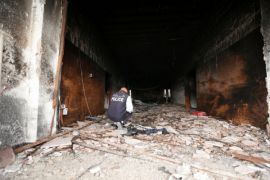Six months after rising up against one of the world`s most feared regimes, Libya`s rebels were on the brink of victory Tuesday, having brought most of Tripoli under their control and secured broad international recognition.
The hope aroused by the sight of another tumbling dictator was tempered by fears over the viability of a Libya run by former rebels who have the bit between their teeth but little experience in democratic governance.
"We urge them to now show restraint in these final hours and respect for all Libyans in the days and months to come," the New York Times said in an editorial, as fighting still raged around Kadhafi`s Tripoli residence.
"They have promised to build a democratic Libya. They must keep that promise," the newspaper said.
London papers also revelled in the downfall of one the planet`s most reviled autocrats but urged restraint and guarded against a wave of reprisals targeting the crumbling regime`s former apparatchiks and hangers-on.
"Some of the young men who have fought on the rebel side will want retribution. They may also feel they have a right to the jobs and the perks their opponents enjoyed," The Guardian said.
"All in Libya must be wary of exploiting an inevitable period of chaos in order to settle old scores, win tribal advantage or wreak revenge on former instruments of the regime," said The Times newspaper.
In countries that backed the NATO intervention in Libya, there was a sense the initially controversial decision by Western leaders to commit to yet another uncertain military operation had been vindicated.
"The Libyan insurgents` triumph is also a victory for NATO, without which their endeavour had little chance of succeeding," France`s Le Figaro said.
"Notably, it is undeniably a success for French diplomacy," the rightwing daily said in an editorial entitled: "France was right in Libya."
French President Nicolas Sarkozy spearheaded Western intervention in the conflict and was the first to recognise the rebel government as legitimate.
"When critics in Washington and elsewhere declared Libya a quagmire, these leaders refused to back away," the New York Times also wrote.
In China, where the authorities maintained a strict policy of non-interference, newspapers argued the onus was on the West to help Libya rebuild.
"Overthrowing Kadhafi is entertainment for the media, but talk of rebuilding is not," The Global Times, a conservative English-language daily, said in an editorial.
"There are too many places in the world that need to be rebuilt right now," it said. "The West is going through economic hardship now, and it is doubtful whether it can stand the Libyan burden."
Newspapers in Libya`s neighbour Algeria however argued that there are clear losers and winners in the Libyan conflict and that failure to choose sides as the Arab Spring swept the region would come at a price.
"The map of north Africa is changing fast and Algeria is just observing, groping and shilly-shallying," the French language El Watan daily said.
The Quotidien d`Oran newspaper warned that the new administration of one of Africa`s top oil powers would remember where their friends stood during the war.
"Algiers was static and non-committal. It should now expect stormy relations with the new rulers of Libya," it said.
The wind of popular discontent blowing on the region has sent Tunisia`s Zine el Abidine Ben Ali scurrying into exile, forced Egypt`s Hosni Mubarak to step down and rattled deeply entrenched regimes in Yemen and Syria.
In a conclusion echoed by many other newspapers around the globe, the New York Times stressed it was likely that Kadhafi was the latest but not the last domino to tumble.
"The rebels` victory -- if followed by the democracy they promise -- should inspire others to believe that the battle is worth fighting. And no autocrat, no matter how brutal, is invincible," it said.
(Uu.B002)
Editor: Priyambodo RH
Copyright © ANTARA 2011











